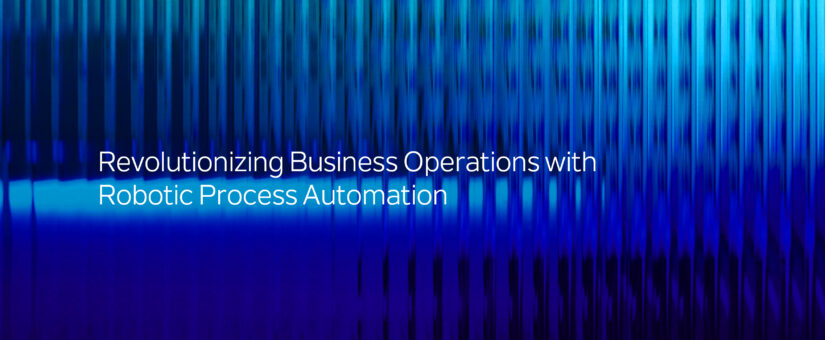
Revolutionizing Business Operations with Robotic Process Automation
- Posted by Ali Mazhar
- On October 16, 2023
In today’s rapidly evolving digital landscape, businesses are continually seeking innovative ways to enhance efficiency, streamline operations, and maximize productivity. One such transformative technology that has gained significant traction is Robotic Process Automation (RPA). This cutting-edge solution holds the potential to revolutionize the way organizations handle repetitive tasks and processes, offering a blend of technical and business benefits. However, like any technological advancement, RPA comes with its own set of challenges. In this blog, we’ll delve into the technical and business aspects of RPA, overviewing its advantages and disadvantages.
Technical Benefits of RPA:
1. Efficiency and Accuracy: RPA enables the automation of routine and rule-based tasks, significantly reducing human errors and ensuring consistent, accurate results. Bots perform tasks with precision and speed, leading to improved process efficiency.
2. Cost Savings: By automating tasks that were previously performed by human employees, organizations can achieve substantial cost savings in terms of labor expenses. RPA solutions often have a higher initial investment but lead to significant long-term savings.
3. Increased Productivity: Employees can be freed from repetitive tasks to focus on more strategic and creative endeavors, leading to increased overall productivity. This also boosts employee morale and engagement.
4. 24/7 Operations: RPA bots can operate around the clock, leading to continuous and uninterrupted process execution. This is especially valuable for processes that require constant monitoring or quick response times.
5. Seamless Integration: RPA tools can seamlessly integrate with existing IT systems and software, requiring minimal disruption to current operations. This compatibility ensures a smooth transition to automated processes.
Business Benefits of RPA:
1. Faster ROI: RPA implementations often yield rapid returns on investment due to the immediate impact on efficiency and reduced operational costs. This allows organizations to allocate resources to other strategic initiatives.
2. Enhanced Customer Experience: RPA-driven processes enable quicker response times, leading to improved customer service. Automation ensures that customers receive timely and accurate information, fostering loyalty and satisfaction.
3. Scalability: RPA solutions can be easily scaled up or down based on business needs. This agility allows organizations to adapt to changing demands without overcommitting resources.
4. Regulatory Compliance: RPA ensures that tasks are performed in a consistent and standardized manner, reducing the risk of non-compliance with regulations and industry standards.
5. Data Analytics and Insights: RPA generates valuable data during its automated processes. This data can be analyzed to identify patterns, trends, and areas for further optimization, enabling data-driven decision-making.
Technical Challenges of RPA:
1. Complex Implementation: While RPA promises ease of integration, implementing it can be complex, especially in large and established organizations. Process identification, workflow design, and system integration require meticulous planning.
2. Maintenance and Updates: RPA bots need regular maintenance and updates to adapt to changing processes and systems. Failure to keep bots up-to-date can lead to disruptions and inefficiencies.
3. Limited Cognitive Abilities: RPA bots are designed for rule-based tasks and lack the cognitive abilities of humans. They struggle with tasks that involve decision-making based on non-standard data or require nuanced understanding.
4. Security Concerns: As bots handle sensitive data and perform critical tasks, ensuring the security of RPA processes is paramount. Weaknesses in bot security could lead to data breaches or operational disruptions.
5. Integration with Legacy Systems: Organizations with legacy systems might face compatibility issues when integrating RPA with their existing infrastructure.
Business Challenges of RPA:
1. Initial Investment: The setup and deployment of RPA solutions can require a significant initial investment, which might deter some businesses from adopting the technology.
2. Process Complexity: Not all processes are suitable for automation. Complex and non-standard processes might not yield the same benefits from RPA as more standardized tasks.
3. Dependency on IT: RPA implementation often involves collaboration with IT teams. If there’s a lack of alignment between business and IT, it can hinder the successful deployment of RPA.
4. Monitoring and Governance: As the number of bots increases, monitoring their activities and ensuring they adhere to regulations and guidelines becomes challenging.
5. Resistance to Change: Employees might be apprehensive about RPA implementations due to concerns about job displacement. Managing this resistance and facilitating a smooth transition is crucial.
In conclusion, Robotic Process Automation offers a powerful means to enhance operational efficiency, reduce costs, and improve overall business outcomes. Its technical benefits, such as efficiency, accuracy, and scalability, are complemented by its business advantages, including cost savings, enhanced customer experiences, and faster ROI. However, challenges related to implementation complexity, maintenance, security, and employee resistance must also be carefully managed to unlock the full potential of RPA. As businesses continue to navigate the digital landscape, RPA stands as a compelling tool in their arsenal, reshaping processes and paving the way for a more agile and competitive future.




